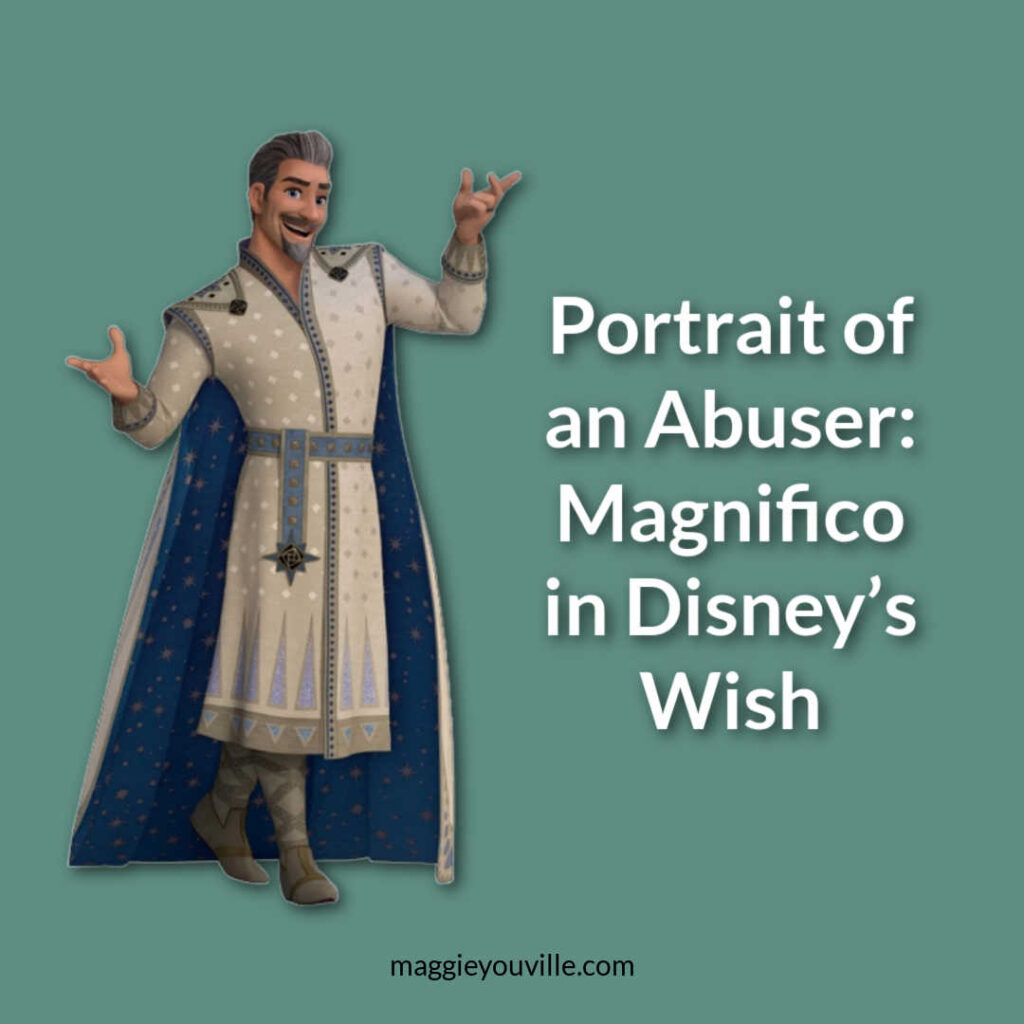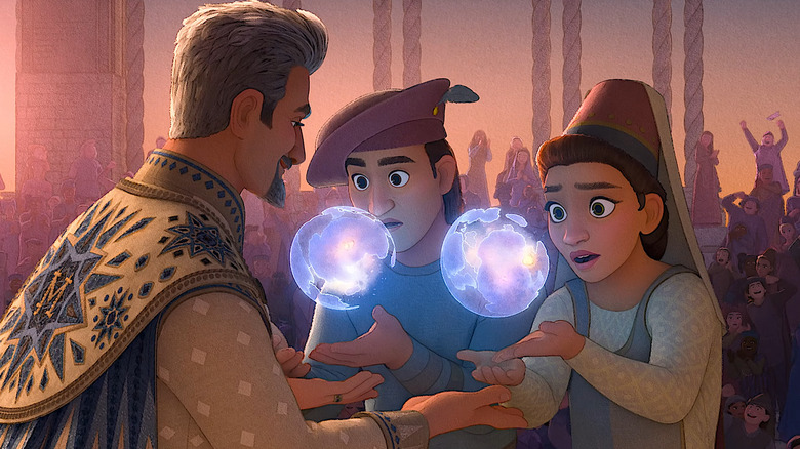Several Disney movies have included abusive or narcissistic characters, from Tangled’s Mother Gothel to Encanto’s Abuela. No Disney movie is more clearly a portrait of a narcissist than Wish. In the space of an hour and a half (for the viewer) or a few days (for the people of Rosas), Magnifico goes from benevolent king to manic sorcerer.
While his transformation may seem unprecedented and shocking to some viewers (like my teenage daughter), it is uncannily familiar to many women who have dealt with such an abuser in their own lives. Women living with a narcissistic husband may see themselves in Queen Amaya, albeit without her position and resources to help free themselves from his control.
Here are the things that identify Magnifico as a narcissist and show the brilliance of Wish’s screenwriters in so clearly portraying the most frightening of villains–the villain who doesn’t look like a villain at all.

The Narcissist Has a Traumatic Backstory
Magnifico tells Asha that he became a sorcerer because, like her, he suffered a “great loss” as a child: “My entire family. Our lands were destroyed by selfish, greedy thieves. Hmm, if only I’d known magic then.” He keeps a burnt tapestry in his office to remind him of this event, and mentions it several times, always with anger. Although he would now appear to be a happy, powerful, well-liked ruler, he has never really moved on (or healed) from this past event.
Trauma does not dictate that a person becomes a narcissist; what matters is how a person handles that trauma. Asha also has childhood trauma; she lost her father to illness at age 12. However, we see the difference in how they each react to this trauma. Asha shares her memories of her father softly, with tears in her eyes, reflecting on what she learned from him. Magnifico speaks angrily, blaming the thieves, but doesn’t actually speak about his own emotions.
Psychology Today explains that a person “may have a strong narcissistic streak if their articulation of a past trauma is absent of specific and discreet feeling states. They may explain, in detail, how bad they had it, but they do not identify any nuanced emotions. Instead of talking about their internal landscape, they constantly direct blame at ‘the bad guy’ from their past. In doing so, they position themselves as the ‘victim.’”
As Catholics, we understand that suffering is part of our journey here on earth. Our choice lies in how we respond to that suffering or trauma. We can either become angry, controlling, and bitter as Magnifico does, or we can become gentle, caring, and giving as Asha does. We see this latter response to suffering (and past childhood trauma) in the lives of many of the saints. I also saw this in the Catholic abuse support groups I joined after my separation, where other women of faith who have walked through abuse and divorce turned their own pain around to offer help and support to me.
The Narcissist Shares Too Much Information Too Soon
Just minutes into his interview with Asha, Magnifico invites her to see the wishes. He admits, “You’re one of the very few I have ever invited in here.” Many of us would assume he sees something in Asha (as Queen Amaya does) that causes him to make this decision. Perhaps he recognizes her weakness truly is that she cares too much, or knows that she will be as enthralled with the wishes as he is (and she is).

However, this sharing of too much personal information too fast is also a trait of narcissists which draws their victims in. The narcissist builds sympathy for himself by oversharing information with his victim, as Magnifico does in telling Asha about his past trauma and then also sharing his greatest treasure with her.
Psychologist Amber Wardell explains, “In my opinion, recognizing the signs of unsafe disclosures is one of the fastest ways to identify someone with narcissistic traits. I believe this is the case because, firstly, the unsafe disclosures typically begin very early in the relationship with these types of people. Secondly, these unsafe disclosures have very obvious signs: the lack of emotional vulnerability, the vilification of practically everyone from their past, the ‘perpetual victim’ narrative, and the implication that their pain is worse than yours or anyone else’s for that matter.”
The Narcissist Has a Double Personality
Throughout Wish, Magnifico flips rapidly between his friendly, cheerfully, benevolent king face and his angry, paranoid, controlling sorcerer face. Disney Wiki says, “Magnifico is charming and charismatic, presenting himself as an innovative mind and inspiring man worthy of the kingdom of Rosas.”
However, his “good intentions have long since become twisted into a vain and self-absorbed ego. While deluding himself into thinking he is still a man of the people, he is self-righteous and arrogant, believing he alone knows what’s best for all in his kingdom. While still motivated by his past trauma, his actions, ultimately, are driven by a paranoid fear of losing control of all he worked for.
His charming facade cracks during Asha’s interview when she challenges him about the wishes. When he doesn’t have an audience requiring him to maintain his image, his true colours come out in his song “This Is the Thanks I Get.” The use of mirrors in Wish highlights Magnifico’s vain and self-absorbed ego, as does his acceptance of Queen Amaya’s praise (she tells him, “You are their handsomest, most beloved king” and he answers, with a smirk, “You’re right. I am a handsome king.”)
It is this tendency of narcissists to have a public facade that makes it so hard for their victims to be seen and heard. Everyone in the community may see the narcissist as the most friendly, helpful, caring guy in the community. As Magnifico says, he’d give the clothing off Benito’s back if you needed it and he’d be the first to volunteer Henry if your home was to crumble. He grants wishes (fourteen in one year!) and doesn’t charge rent to his subjects.
However, beneath this “helpful” facade (or his delusion that he is helping others), he’s really just doing what is best for himself. He refuses to grant Sabino’s wish because it’s “too vague,” while he grants other wishes that benefit him (like Simon’s desire to be a knight). Magnifico himself makes no sacrifices for his people; he takes away each person’s passions, dreams, and sense of self, and uses that for his own pleasure.
At the beginning of Wish, Magnifico is mostly charming and occasionally angry; by the end of the movie, he is all anger and hardly charming. Most real-life narcissists do not transform so quickly from charm to monster, but anyone who has been in a long-term relationship with a narcissist will recognize the pattern happening here.
The Narcissist Is Paranoid
When Star appears in the sky over Rosas, the people are delighted. Everyone welcomes the bright light with smiles and wonder on their faces–except the King. He is instantly suspicious and angry and jumps to the conclusion that “I have just been threatened.” Someone must be using magic, which is illegal for anyone except him in Rosas (wait a minute–why?).

The king’s reaction to Star is contrasted strongly against the reactions of his subjects. Star’s appearance challenges Magnifico’s image. He cannot control Star, so Star must be a threat. This paranoia drives him to desperate measures, including dark magic, deception, and violence.
Dr. Les Carter explains, “Narcissists fear being rejected. They fear being deemed inadequate, insignificant, or irrelevant. Narcissists fear being mocked, ridiculed, and invalidated. They fear appearing stupid or uninformed. On the outside, they desperately want to be known as A Force To Be Reckoned With, but make no mistake, they are in an ongoing mode of compensating for their fears.”
In real life, it may be harder to see the paranoia that a narcissist shows. For example, an abuser may be paranoid about his wife hanging out with male friends. He may want to control all the family finances or may have troubles trusting others with anything in his life. The paranoia (and lack of trust) may be seen in the rules that surround the relationship–a long list of things that the wife (or child) may not do, or must do, to keep her abuser happy.
The Narcissist Isolates His Victims
It may seem strange to talk about isolation in a movie that is basically about an entire village. Asha is surrounded by her mom, grandpa, and seven friends, and Queen Amaya has the entire village around her. However, as Asha explains in the prologue, Magnifico “found the most perfect island deep in the Mediterranean Sea” on which to found Rosas.
Deep in the Mediterranean Sea. Far from any other island or town. The entire village is isolated. While many people emigrate to Rosas, they seem to be coming from worse situations, and so are drawn in by the perfect utopia presented when they arrive. When–or if–they realize it’s not really a utopia, it’s much harder to leave.
Asha and her friends have grown up on Rosas and accept their lives as normal. They don’t question the rules and brush off the new arrivals’ questions about giving up their wishes. One man asks Asha, “Do you really forget your wish once you give it?” She answers quickly, “You forget without regret.” This is her assumption, because she’s grown up with this and doesn’t question it.

Isolation is a common tactic in narcissists. This may appear positive at first–a boyfriend who loves his girlfriend so much that he wants to spend all his time with her and gets lonely when she wants to see her friends instead. He may simply keep her so busy that she no longer has time for her family or friends.
Other tactics that build isolation include creating conflict between her and her family, so that she eventually chooses him (because Genesis 2:24 says “a man leaves his father and his mother and cleaves to his wife, and they become one flesh”). He may also move the family frequently, in search of work or school, and thus physically isolate the woman from her support networks.
The Catholic Church’s advice to be open to life can also aid the narcissist in isolating the woman. This openness to life requires a self-giving love that the narcissist is not capable of. Because babies and toddlers need a lot of time and attention, and often make it hard to get out of the house, a woman may find herself isolated at home, focused on her “vocation” as a mother and yet also cut off from any support networks (especially if her church doesn’t have a mom’s group). If her husband doesn’t support her by taking an equal role in the childcare, offering her breaks away from the children, or supporting her in pursuing her own dreams and friendships, her isolation (and exhaustion) grows.
The Narcissist Causes His Victims to Lose Themselves
The premise of Rosas is simple: give your wish to the king and he will take care of that wish and possibly make it happen (because otherwise you’d have to work really hard to make it happen and it might not happen anyway). The people of Rosas are happy because the king takes care of their wishes and sometimes grants one.
The dark side of this is that each wish is a vital part of the person. When they give this wish to the king, they give up a part of themselves. Magnifico tells Asha that “people think wishes are just ideas. But no, no, they are a part of your heart. The very best part.”

We see this in Asha’s friend Simon, who mostly sleeps in the kitchen. Gabo asks Asha, “And when you give your wish to the King, you don’t wanna have to end up like Simon here, do you?” Simon seems to have completely lost his personality, his passion, himself since handing Magnifico his wish on his 18th birthday. His friends tell him, “You’re kind of boring now.”
In giving their wishes to Magnifico, the people also give him their obedience and compliance. Sabino has waited a long time for his wish; before he receives it, he defends Magnifico. After receiving his wish, he’s willing to help Asha stand up to the king. The wishes represent more than just a desire to play music to inspire people (as Sabino wants); it represents his entire being, his core self, his values and beliefs.
Catholic author and comedian Jennifer Fulwiler refers to this as a person’s “blue flame.” She explains that a blue flame is “something you do, and were destined to do, that fills you with energy and adds love to the world.” Like Sabino and his daughter, Jennifer was living a dull, grey life as a suburban housewife, overwhelmed by housework and kids and daily life. When she found her blue flame, that all changed:
“I felt powerful instead of powerless. I still had bad days—lots of them—and was still a disaster in plenty of areas. There was still a pile of dolls with toddler-scissor haircuts in the corner of my living room. But underneath the hard times and the daily frustrations was a deep satisfaction. I now woke up each morning with a sense of purpose. I felt as though I was living the life I was meant to live and having the impact I was meant to have.”
Whether we call it our wish, our blue flame, our dream, our passions, our core self–this is an important part of each of us. A God-given talent. And this is what a narcissist destroys in each of his victims. Asha still has her blue flame, so she is quicker to see Magnifico’s deceptions, and she helps Sabino regain his blue flame and then fights for all of Rosas to find their wishes too. (And this is what we want to do here on maggieyouville.com–help you regain your wish too.)
There’s No Happy Ending
When my teens watched Wish, they didn’t like the ending. They thought that Queen Amaya should be able to give Magnifico a “true love’s kiss” to rescue him from the evil book and turn him back into a good king. (Personally, I think we’re long over Disney’s idea that a kiss can solve every problem.)
Medical News Today states clearly, “Love from another person cannot change a person with [narcissistic personality disorder or] NPD. Only the individual with NPD can make that choice.” They further clarify, “It is not safe to stay in an abusive relationship hoping the person will change. It is also important to be aware that perpetrators of abuse can exploit a person’s desire for love to manipulate them.”
Queen Amaya has Dahlia read Magnifico’s spell book, trying to find a way to break the hold it has on him. However, what Dahlia finds is that “he’s become practically untouchable. No metal can break his staff. No spell can bind his magic. And no one can bring him back from this. ‘Embrace forbidden magic just once, and you commit to it for eternity.’” Magnifico has made his choice and both he and his people must live with that choice now.
The end of the story is realistic rather than idealistic. Queen Amaya sets firm boundaries to protect herself and the people of Rosas from Magnifico. Even when he tries to sweet-talk her, she sticks to these boundaries. He distorted her wish–to serve the people of Rosas–for years, using it to keep her in service to him, but now she has recovered it and is truly serving her people.
The Narcissist In Your Parish
In Wish, Disney storytellers and animators paint a clear picture of a narcissist–a charismatic, good-looking king who at first glance seems to be working hard for his people and taking care of everyone. Magnifico is a good reminder that appearances can deceive.
As God tells Samuel, “Have no regard for his appearance or stature, because I haven’t selected him. God doesn’t look at things like humans do. Humans see only what is visible to the eyes, but the Lord sees into the heart” (1 Samuel 16:7 CEB). Jesus tells his disciples, “Look, I’m sending you as sheep among wolves. Therefore, be wise as snakes and innocent as doves” (Matthew 10:16 CEB).
As Christians, we must be willing to see each person for who they are. Narcissists in our parish are not as obvious as Magnifico in Wish, but the clues are there for a discerning person.
For those of us in abusive relationships, it can often take years to recognize the abuse and to see all the signs of narcissism. It can be difficult to stand up to the abuse, because unlike Queen Amaya, we don’t have our entire village on our side.
If you have been approached by a friend or parishioner who believes she’s in an abusive relationship, please hear her. She has everything to lose in speaking up, and has usually reached this conclusion with great pain and difficulty. Try to look beyond what is visible to the eyes, to see the heart–the wish–of each person and who is living their true beliefs, who is living the values of the Catholic Church, who is not wearing a facade.
Leave a Reply